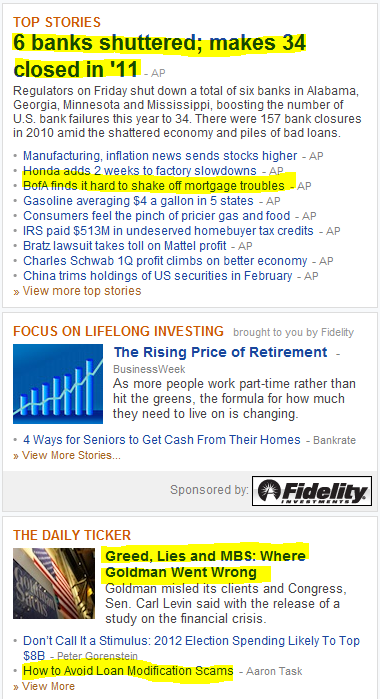The Inside Job
My wife and I just finished watching The Inside Job, a documentary about the subprime derivative industry and its cataclysmic impact on global markets beginning a few years ago and still rippling through the world’s economy today. Although most of it I had already read about in “The Big Short” and “All the Devils are Here” (the latter of which is an especially brilliant account of the whole story), the film did a great job of distilling it down into less than 2 hours. As with any documentary, editing and narration are used to further the thesis of the film, which sometimes feels a bit manipulative. Still, given my prior reading on the subject, the film really did basically hit the nail on the head, and even touched on what I believe is the core of the problem: failure to disclose, recognize and respond to disincentives throughout the financial industry, including academia.
The subprime fiasco has definitely challenged my belief that free market capitalism is the best economic system man has yet found. I still believe many of the problems came from the fact that we don’t have a truly free market economy (in which there would not have been an assumption that a bank, if big enough, would be bailed out no matter how mismanaged). Yet it seems that regulation is warranted when it comes to keeping incentives reasonable. After all, part of the problem was that bank executives, thanks to their cronies on their boards, got paid exorbitant paychecks for short-term profits, with no regard to where they were steering the company long-term. In theory, a free market would punish this sort of management by a lack of investors, but unfortunately the financial world isn’t as efficient a market as theorists would like to believe. There’s plenty of herd mentality at play, and plenty of examples where investors’ assumptions, enthusiasm, fear and hope overcome a truly honest assessment of the facts.
I’m still not sure where I stand. I ardently reject the blind faith so many in our country have that the government is somehow better at preventing catastrophes like this than anybody else. And yet, there does seem to be a place for some level of policing of the financial system. The free market combined with a few basic laws meant to prevent anti-competitive behavior may work in theory, but in practice, greed and short-sightedness seem to have the potential to do plenty of damage within the free market system. On the other hand, an overly micro-managed economy is bound to be inefficient and susceptible to a host of other problems, as the global failure of communism has shown. It seems, as with most things, the answer is a balance. I lean toward the more libertarian end of the spectrum because I have a general skepticism of government, but clearly blind faith in corporations to self-regulate appears to be foolish as well.
Anywho, it’s a good film and you should watch it. Ought to be mandatory viewing in any business school, although as the movie points out, broken incentives exist even in academia.
As a darkly amusing side-note, all it took was a visit to Yahoo! Fiannce to be reminded that despite the Dow being nearly back at its peak, this sh*t ain’t over:


Comments